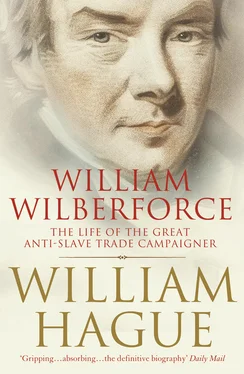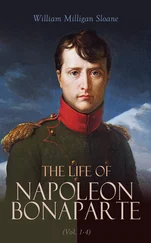It was into this crowded scene that William Wilberforce was born, in the family home on the High Street, on 24 August 1759. His father had taken over the house four years before, when old Alderman Wilberforce retired to the quieter atmosphere of a country home at Ferriby, seven miles upstream on the Humber. Robert Wilberforce had married Elizabeth Bird and had taken over the management of the family business in the absence of his elder brother, who had evidently decided to make the most of the family’s prosperity and move to London. Robert and Elizabeth were to have four children. The first and the fourth, Elizabeth and Anne, would die at the ages of fourteen and eight respectively: even in a well-to-do household childhood mortality in the eighteenth century was high. The second daughter, Sarah, was eighteen months old when the baby William was born. He was a discouragingly small and fragile child, with weak eyesight to compound the gloom, and he is said to have expressed thankfulness in later life ‘that I was not born in less civilised times, when it would have been thought impossible to rear so delicate a child’, 6and such a frail little thing could have been abandoned. Very little is recorded of his earliest years, but it was soon obvious that despite his physical infirmities he was intelligent and personable. The Wilberforce family presumably hoped that if he lived he would become the latest in their line of successful merchants, part of the ‘property, trade and profits’ which were the ‘dominant terms’ of eighteenth-century England. 7Those looking for clues to his later choices in life will not find them in his infant years. While his great future friend William Pitt, born only twelve weeks before him, was already resolved at the age of seven to serve in the House of Commons, the young William Wilberforce spent his first eight years in a household dominated by the business world. His immediate family had no strong connection with national politics, and showed no special zeal for religion. For all the fact that their son was born in the great ‘year of victories’, in which Canada and India were falling under British dominion, and Horace Walpole was writing, ‘One is forced to ask every morning what victory there is, for fear of missing one,’ 8it seems that the horizons of Robert and Elizabeth Wilberforce were predominantly local and financial.
If family wealth was a first crucial ingredient in the later career of William Wilberforce, then the experience of learning from a teacher he liked and respected was a second. While the Wilberforces were rich, they did not adopt the practice of the nobility and landed gentry by sending their son to a private school such as Eton. It is fair to assume that the bustling nature of their household and the family’s strong participation in local affairs turned them against the other educational option for the wealthy of the eighteenth century, educating a child at home. Consequently, William joined the sons of other Hull merchants in attending Hull Grammar School, a short walk from 25 High Street down the cobbled Bishop Lane, through the teeming marketplace and past the Holy Trinity church. He later recalled walking there ‘with satchel on my shoulder’ 9and having his meals at home.
Eighteenth-century grammar schools varied enormously in the quality of education they provided. Often dependent on a single teacher, their fortunes thereby fluctuated along with the standards of that teacher. The subjects taught could amount to anything from a strict classical curriculum to the inclusion of more ‘practical’ subjects such as arithmetic, navigation, science or French. William was lucky, because the departure of the incumbent headmaster within a few months of the new pupil’s arrival brought onto the scene a new teacher, Joseph Milner, with whom he would enjoy a lifelong friendship.
Joseph Milner was brought up in Leeds, the son of a journeyman weaver who placed a high priority on his sons’ education despite his poverty, and who recalled that ‘Once, on a Saturday evening, I surprised my wife, by sending home a Greek book for my son Joseph, instead of a joint of meat for the succeeding Sunday’s dinner. It was too true that I could not send home both.’ 10Sent to Leeds Grammar School despite his father’s lack of formal education, he rapidly emerged as a prodigy, with verses published in the local newspaper and his teacher declaring that ‘Milner is more easily consulted than the dictionaries … and he is quite as much to be relied on.’ 11Having been dispatched to Cambridge with the financial support of ‘several liberal gentlemen’ of Leeds, he was twenty-three years old when he was interviewed for the job of headmaster at Hull, and duly appointed with the influential support of Alderman Wilberforce. With him he brought his younger brother Isaac, who had been taken out of school when he was twelve because of his father’s death. Isaac too showed exceptional intelligence, and now briefly performed the role of school usher, helping to teach the younger boys.
Under Milner’s leadership, it was not long before Hull Grammar School had become a popular and educational success. One of his pupils later recalled: ‘He appeared as if he knew all the different authors by heart; entered at once into their meaning, genius, taste, history … His mind shone every day with the utmost brightness and splendour … His whole school loved, revered, adored him for his wonderful abilities, for his simplicity, and for his easiness and readiness in communicating knowledge.’ 12Others recollected that ‘he rarely latterly inflicted corporal punishment’, and remembered ‘the caustic yet temperate ridicule with which he remarked on the custom of getting by heart the Latin syntax before some progress was made in the language … When some proficiency in the Latin language was obtained, he directed us simply to read a book, so as to be able to answer questions on the substance of it.’ 13Milner thus brought an innovative touch to the teaching of the traditional curriculum, and his pupils also loved mathematics and algebra, and had the benefit of the town having spent seven guineas on a pair of globes, the first recorded in the school. A large and apparently ungainly man, Milner ‘generally came in about nine in the morning: at eleven the school was dismissed: the scholars went to learn writing and arithmetic elsewhere. The afternoon school hours are from two til five in the summer, and until four in the winter months.’ 14Within two years the schoolroom was ‘crowded’, with plentiful fees bringing Milner’s income to ‘upwards of two-hundred pounds per annum’ 15rather than the salary of thirty guineas which had originally been envisaged.
While William might easily have been bullied or lacking in confidence on account of his fragility, his experiences at Hull Grammar School evidently fortified his natural abilities. He was bright, engaging and confident; Isaac Milner would later recall that William’s elocution ‘was so remarkable that we used to set him upon a table, and make him read aloud as an example to the other boys’. 16It must have been a happy time for a seven-year-old boy: a good teacher, many friends, a caring family, and a large house enjoying an endless procession of visitors, traders and activities. In the summer months he was able to go out to his grandfather’s house at Ferriby and enjoy the sights and sounds of the English countryside. Then tragedy struck. In the late spring of 1768, when William was almost nine, his family was torn apart. Only months after celebrating the birth of his fourth child, Anne, and around the same time as the death of the eldest daughter, Elizabeth, Robert Wilberforce died at the age of thirty-nine. This tragic sequence was to bring about the first of two wrenching upheavals in William’s early life.
Elizabeth Wilberforce struggled to cope after the death of her husband. Wilberforce would later write, ‘Some months after [his father’s death] my Mother had a most long and dangerous fever.’ 17It was decided that he would be moved to London, into the care of his father’s elder brother William and his wife Hannah. Arriving in London in the autumn of 1768 after a week’s stay with his cousins in Nottingham, William made his first acquaintance with what would become very familiar territory: his aunt and uncle owned a spacious villa in Wimbledon, then a village of just under a thousand residents separated by several miles of countryside from the capital, as well as a house in St James’s Place, yards from London’s fashionable clubs. For all their resources, his aunt and uncle did not find for him a school to measure up to the education he had been used to at Hull. He was sent to a boarding school at Putney, which he later remembered as ‘one of those little schools where a little of everything reading, writing, arithmetic etc is taught: a most wretched little place. I remember to this day the Scotch usher we had: a dirty disagreeable man.’ 18Charity boys were crammed into the upstairs; William and other pupils from better-off families, including a number of sons of West Indian plantation-owners, lived downstairs. He considered it ‘a very indifferent school’, a rather generous judgement given the mediocre education it gave him and the necessity of coping with ‘the things which we had for breakfast, which were so nasty, that I could not swallow them without sickening’. 19
Читать дальше











